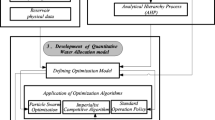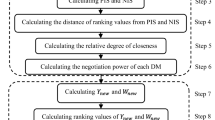Abstract
In the present study, qualitative simulation model of reservoir and genetic algorithm optimization model were combined based on fuzzy logic to determine the trade off curve with stochastic quantitative and qualitative objectives. According to contradictory utilities of decision makers with respect to the obtained optimum trade off curve, a model of group conflict resolution was developed in order to determine the best point on the trade off curve from the perspective of decision makers. Using the outcome of conflict resolution model which was indicative of acceptable water quality for all decision makers, the optimization model was re-run, and time series of monthly water opeartion was determined for the agreed quality of beneficiaries. Finally, with the aim of formulating timely policies of operation of the reservoir, the use of probabilistic support vector machines that have the ability to create output possibilities was suggested. The proposed model was used for the operation of 15-Khordad Dam Reservoir, Iran. The results demonstrate the efficiency and accuracy of the fuzzy optimization model as well as the importance of using group conflict resolution model to provide the utility of decision makers in the operation of the reservoir.














Similar content being viewed by others
References
Abed-Elmdoust A, Kerachian R (2012) River water quality management under incomplete information: application of an n-person iterated signaling game. Environ Monit Assess 184(10):5875–5888
Bazargan-lari MR, Kerachian R, Mansoori A (2009) A conflict-resolution model for the conjunctive use of surface and groundwater resources that considers water-quality issues: A case study. Environ Manag 43(3):470–482
Chae S, Heidhues P (2004) A group bargaining solution. Journal of Mathematical Social Sciences 48(1):37–53
Ganji A, Khalili D, Karamouz M (2007) Development of stochastic dynamic nash game model for reservoir operation. I: The symmetric stochastic model with perfect information. Adv Water Resour 30:528–542
Harsanyi JC, Selten R (1972) A generalized nash solution for two-person bargaining games with incomplete information. Manag Sci 18(5):80–106
Homayounfar M, Zomorodian M, Martinez CJ, Lai S (2015) Two monthly continuous dynamic model based on nash bargaining theory for conflict resolution in reservoir system. PLoS One 10(12):e0143198. https://doi.org/10.1371/journal.pone.0143198
Kerachian R, Karamouz M (2006) Optimal reservoir operation considering the water quality issues: a stochastic conflict resolution approach. Water Resour Res 42:1–15
Kerachian R, Karamouz M (2007) A stochastic conflict resolution model for water quality management in reservoir-river systems. Adv Water Resour 30(4):866–882
Kerachian R, Shirangi E (2008) A Case Study for Conflict Resolution in Reservoir Operation for Water Quantity and Quality. World Water and Environmental Resources Congress, Hawaii
Madani K (2010) Game theory and water resources. J Hydrol 381(3–4):225–238
Mahjouri N, Ardestani M (2010) A game theoretic approach for interbasin water resources allocation considering the water quality issues. Environ Monit Assess 167(1–4):527–544
Nash J (1953) Two-person cooperative games. Econometrica 21(1):128–140
Niksokhan MH, Kerachian R, Karamouz M (2009) A Game theoretic approach for trading discharge permits in rivers. Water Sci Technol 60(3):793–804
Sadegh M, Kerachian R (2011) Water resources allocation using solution concepts of fuzzy cooperative games: Fuzzy least core and fuzzy weak least core. Water Resour Manag 25(10):2543–2573
Salazar R, Szidarouszky F, Coppola E, Rojana A (2007) Application of game theory for groundwater conflict in Mexico. J Environ Manag 84(4):560–571
Shirangi E, Kerachian R, Shafai Bajestan M (2008) A Simplified model for optimal reservoir operation considering the water quality issues: Application of the young conflict resolution theory. Environ Monit Assess 146(1–3):77–89
Soltani F, Kerachian R, Shirangi E (2010) Developing operating rules for reservoirs considering the water quality issues: Application of ANFIS-based surrogate models. Expert Syst Appl 37(9):6639–6645
Parsapour-Moghaddam P, Abed-Elmdoust A, Kerachian R (2015) A Heuristic evolutionary game theoretic methodology for conjunctive use of surface and groundwater resources. Water Resour Manag 29(11):3905–3918
Willey RG, Smith DJ, Duke H Jr (1996) Modeling water resources systems for water-quality management. J Water Resour Plan Manage ASCE 122:171–179
Young HP (1993) An evolutionary model of bargaining. J Econ Theory 59(1):145–168
Author information
Authors and Affiliations
Corresponding author
Additional information
Publisher’s Note
Springer Nature remains neutral with regard to jurisdictional claims in published maps and institutional affiliations.
Rights and permissions
About this article
Cite this article
Mojarabi-Kermani, A., Shirangi, E., Bordbar, A. et al. Stochastic Optimal Reservoir Operation Management, Applying Group Conflict Resolution Model. Water Resour Manage 33, 2847–2865 (2019). https://doi.org/10.1007/s11269-019-02271-2
Received:
Accepted:
Published:
Issue Date:
DOI: https://doi.org/10.1007/s11269-019-02271-2




